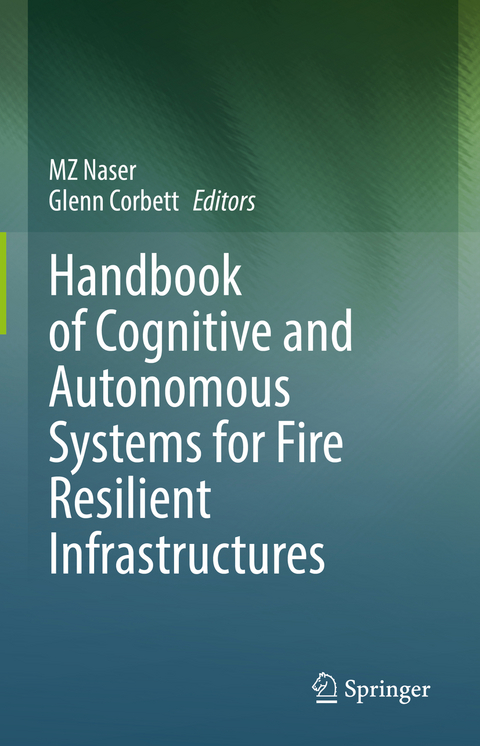
Handbook of Cognitive and Autonomous Systems for Fire Resilient Infrastructures
Springer International Publishing (Verlag)
978-3-030-98684-1 (ISBN)
This handbook aims at modernizing the current state of civil engineering and firefighting, especially in this era where infrastructures are reaching new heights, serving diverse populations, and being challenged by unique threats. Its aim is to set the stage toward realizing contemporary, smart, and resilient infrastructure.
The Handbook of Cognitive and Autonomous Systems for Fire Resilient Infrastructures draws convergence between civil engineering and firefighting to the modern realm of interdisciplinary sciences (i.e., artificial intelligence, IoT, robotics, sensing, and human psychology). As such, this work aims to revolutionize the current philosophy of design for one of the most notorious extreme events: fire. Unlike other publications, which are narrowed to one specific research area, this handbook cultivates a paradigm in which critical aspects of structural design, technology, and human behavior are studied and examined through chapters writtenby leaders in their fields.
This handbook can also serve as a textbook for graduate and senior undergraduate students in Civil, Mechanical, and Fire Protection engineering programs as well as for students in Architectural and social science disciplines. Students, engineers, academics, professionals, scientists, firefighters, and government officials involved in national and international societies such as the American Society of Civil Engineers (ASCE), Society of Fire Protection Engineers (SFPE), National Fire Protection Association (NFPA), and Institute of Electrical and Electronics Engineers (IEEE), among others, will benefit from this handbook.
lt;p> M.Z. Naser is a faculty member at the School of Civil and Environmental Engineering and Earth Sciences & the Artificial Intelligence Research Institute for Science and Engineering (AIRISE) at Clemson University. His research aims to create Causal & explainable machine learning methodologies to discover new knowledge hidden within systems belonging to the domains of Structural fire engineering and Materials science to help us realize functional, sustainable, and resilient infrastructure.
Glenn Corbett is an Associate Professor of Fire Science and Public Management at John Jay College of Criminal Justice in New York City. He has spent over 40 years in the fields of fire protection and firefighting. He is a registered professional fire protection engineer in the State of Texas. His interests include building disaster investigations and modernizing fire protection test standards and design practices.Chapter. 1.- Toward A Sociotechnical Systems Framing For Performance-Based Design For Fire Safety.- Chapter. 2.- A 21st Century Approach To Fire Resistance.- Chapter. 3.- Integrating Modern Technologies To Realize Fire-Resistant Infrastructures.- Chapter. 4.- Intelligent Science Empowers Building Fire Protection Technology Development.- Chapter. 5.- Building Codes And The Fire Regulatory Context Of Smart And Autonomous Infrastructure.- Chapter. 6.- Perspectives Of Using Artificial Intelligence In Building Fire Safety.- Chapter. 7.- Intelligent Firefighting.- Chapter. 8.- The Role Of Artificial Intelligence In Firefighting.- Chapter. 9.- Implementing AI To Assist Situation Awareness: Organizational And Policy Challenges.- Chapter. 10.- Probabilistic Reliability Analysis Of Steel Mezzanines Subjected To The Fire.- Chapter. 11.- Autonomous Sensor-Driven Pressurization Systems - Novel Solutions And Future Trends.- Chapter. 12.- Hybrid Fire Testing: Past, Present and Future.- Chapter. 13.- Realistic Fire Resistance Evaluation In The Context Of Autonomous Infrastructure.
| Erscheinungsdatum | 30.06.2022 |
|---|---|
| Zusatzinfo | XVII, 337 p. 166 illus., 145 illus. in color. |
| Verlagsort | Cham |
| Sprache | englisch |
| Maße | 155 x 235 mm |
| Gewicht | 691 g |
| Themenwelt | Informatik ► Theorie / Studium ► Künstliche Intelligenz / Robotik |
| Schlagworte | Artificial Intelligence • autonomous structures • cognitive structures • Fire Fighting • Fire Protection • fire resistance • Smart Systems • structural design • structural resilience |
| ISBN-10 | 3-030-98684-5 / 3030986845 |
| ISBN-13 | 978-3-030-98684-1 / 9783030986841 |
| Zustand | Neuware |
| Haben Sie eine Frage zum Produkt? |
aus dem Bereich


